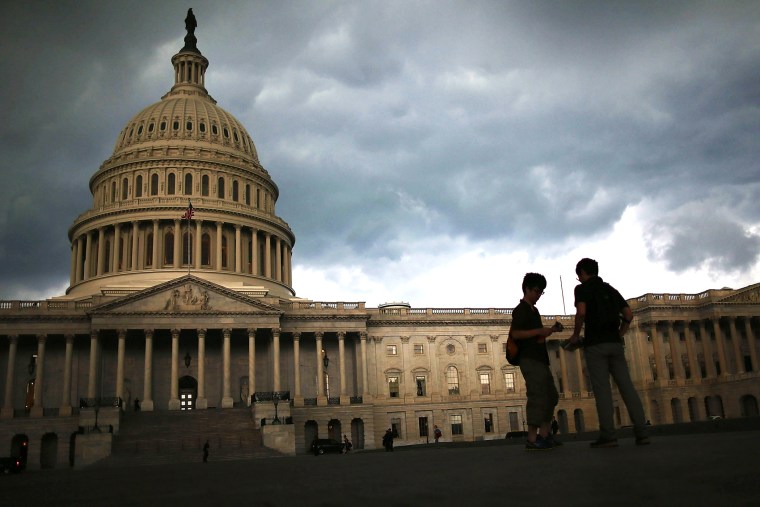The last time Republicans controlled all of the levers of federal power was 2006, which was not an especially good year for the GOP. After Republicans struggled to address a series of scandals -- names like Duke Cunningham, Bob Ney, and Mark Foley may sound familiar to those who were engaged at the time -- Democrats used the "culture of corruption" label to great effect.
It was the year -- the most recent midterm election cycle for a Republican president -- that Democrats rode a wave to reclaiming the majority in the House and Senate.
The question is whether we may soon see a similar dynamic unfold. Over the weekend, the Washington Post's E.J. Dionne Jr. made a compelling case that concerns over corruption may very well be what defines the 2018 elections.
Politics is regularly described in terms of "left" vs. "right." But other binaries can be more relevant. "Forward" vs. "backward" often define a choice facing an electorate better than the standard ideological categories. And the most powerful faceoff of all may be "reform" vs. "corruption."Much commentary on the 2018 midterm campaign has focused on a drift or a lurch left in the Democratic Party, the measurement of the port-side tilt varying from analyst to analyst. In fact, more moderate progressives have done very well in the primaries so far, but Democrats are certainly less enamored of centrism than they were during the 1990s.What is missed in this sort of analysis is that many, maybe most, of us don't think in simple left/right terms, and countless issues are not cleanly identified this way. The same is true of elections. When the returns are tallied in November, the results may be better explained by the reform/corruption dynamic than any other.
Republicans are certainly making it easier for their opponents to frame the debate this way. This morning, for example, Rep. Chris Collins (R-N.Y.) surrendered to the FBI after being indicted on insider-trading charges. His colleague, Rep. Scott Taylor (R-Va.), learned yesterday that a Virginal special prosecutor is examining an electoral scheme launched by his campaign.
This comes the day after Forbes published a rather brutal piece that raised the allegation that Donald Trump's Commerce secretary, Wilbur Ross, "could rank among the biggest grifters in American history."
Meanwhile, the man who led Donald Trump's political operation in 2016, Paul Manaforrt, is currently on trial for a wide variety of alleged felonies. The star witness is Rick Gates -- the deputy chairman of Trump's campaign -- who's testified about all the crimes he and Manafort committed together.
And that's just this week. Worse, it's only Wednesday.
Meanwhile, Trump's EPA chief, Scott Pruitt, was forced to resign in the face of corruption allegations. Trump's Interior secretary, Ryan Zinke, has faced related allegations. Trump's former HHS secretary, Tom Price, was also forced to resign after misusing public funds. Trump's budget director, Mick Mulvaney, recently acknowledged that when he was in Congress, he would only meet with lobbyists who made campaign contributions.
He was, at the time, telling a group of bankers how they could use their money to influence the administration's agenda.
Of course, then there's Trump himself -- one of only three sitting presidents in American history to become the subject of a criminal investigation. And really, that's just the start of the corruption questions surrounding his presidency.
As a candidate, Trump seemed to appreciate public disgust with corruption, which is why he vowed to "drain the swamp." But as Senate Minority Leader Chuck Schumer (D-N.Y.) put it recently, "The swamp has never been more foul or more fetid than under this president."
